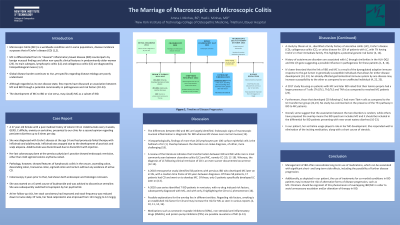Monday Poster Session
Category: IBD
P2738 - The Marriage of Macroscopic and Microscopic Colitis
Monday, October 28, 2024
10:30 AM - 4:00 PM ET
Location: Exhibit Hall E

Has Audio

Amna Minhas, BS
NYIT College of Osteopathic Medicine
Old Westbury, NY
Presenting Author(s)
Amna Minhas, BS1, Hadi Minhas, MD2
1NYIT College of Osteopathic Medicine, Old Westbury, NY; 2Nathan Littauer Hospital, Johnstown, NY
Introduction: Microscopic colitis (MC) has two subtypes differentiated by histopathological means; lymphocytic colitis (LC) and collagenous colitis (CC). Overlap between inflammatory bowel disease (IBD) and MC is rarely seen, or reported. Here, we report a female with established Crohn's Disease (CD), who began developing worsening diarrhea and was found on surveillance colonoscopy to have developed lymphocytic colitis in the setting of CD in remission.
Case Description/Methods: A 27 year old female with a past medical history of colonic CD on ustekinumab every 4 weeks, GERD, C difficile, anxiety on sertraline, presented to our clinic for a second opinion regarding persistent diarrhea up to 6 times per day. She was diagnosed with Crohn’s disease at the age 14 and had previously failed therapy with infliximab and adalimumab. Her last colonoscopy done at the previous physician’s practice showed endoscopic remission, other than mild sigmoid colonic erythema noted. Pathology, however, showed features of lymphocytic colitis in the cecum, ascending colon, descending colon, transverse colon, sigmoid colon and rectum without any evidence of active CD. Colonoscopy 3 years prior to that, had showed both endoscopic and histologic remission. She was started on a 6 week course of budenoside and was advised to discontinue sertraline. She was subsequently switched to bupropion by her psychiatrist. At follow-up visit, her stool consistency improved and frequency was reduced down to twice daily. Her High Sensitivity C-Reactive Protein (HS-CRP) improved from >10 to 6.
Discussion: Although established as separate entities, MC and IBD share some common features. MC can be regarded as a subset of IBD. A 2018 literature review identified 58 patients with previous IBD who developed MC later on in life, with a median time frame of 20 years between diagnoses. Of these 58 patients, 17 patients had CD and went on to develop MC. Of these 17, 5 patients specifically developed LC later on.
Our patient developed LC in response to chronic sertraline use. She responded well to elimination of the inciting medication, along with a short course of steroids. The treatment of IBD often requires the use of chronic medications, which can carry potentially serious short and long term toxicities. Clinicians should be cognizant of this phenomenon of overlapping IBD/MC in order to avoid unnecessary escalation and/or alteration of therapy in IBD.
Disclosures:
Amna Minhas, BS1, Hadi Minhas, MD2. P2738 - The Marriage of Macroscopic and Microscopic Colitis, ACG 2024 Annual Scientific Meeting Abstracts. Philadelphia, PA: American College of Gastroenterology.
1NYIT College of Osteopathic Medicine, Old Westbury, NY; 2Nathan Littauer Hospital, Johnstown, NY
Introduction: Microscopic colitis (MC) has two subtypes differentiated by histopathological means; lymphocytic colitis (LC) and collagenous colitis (CC). Overlap between inflammatory bowel disease (IBD) and MC is rarely seen, or reported. Here, we report a female with established Crohn's Disease (CD), who began developing worsening diarrhea and was found on surveillance colonoscopy to have developed lymphocytic colitis in the setting of CD in remission.
Case Description/Methods: A 27 year old female with a past medical history of colonic CD on ustekinumab every 4 weeks, GERD, C difficile, anxiety on sertraline, presented to our clinic for a second opinion regarding persistent diarrhea up to 6 times per day. She was diagnosed with Crohn’s disease at the age 14 and had previously failed therapy with infliximab and adalimumab. Her last colonoscopy done at the previous physician’s practice showed endoscopic remission, other than mild sigmoid colonic erythema noted. Pathology, however, showed features of lymphocytic colitis in the cecum, ascending colon, descending colon, transverse colon, sigmoid colon and rectum without any evidence of active CD. Colonoscopy 3 years prior to that, had showed both endoscopic and histologic remission. She was started on a 6 week course of budenoside and was advised to discontinue sertraline. She was subsequently switched to bupropion by her psychiatrist. At follow-up visit, her stool consistency improved and frequency was reduced down to twice daily. Her High Sensitivity C-Reactive Protein (HS-CRP) improved from >10 to 6.
Discussion: Although established as separate entities, MC and IBD share some common features. MC can be regarded as a subset of IBD. A 2018 literature review identified 58 patients with previous IBD who developed MC later on in life, with a median time frame of 20 years between diagnoses. Of these 58 patients, 17 patients had CD and went on to develop MC. Of these 17, 5 patients specifically developed LC later on.
Our patient developed LC in response to chronic sertraline use. She responded well to elimination of the inciting medication, along with a short course of steroids. The treatment of IBD often requires the use of chronic medications, which can carry potentially serious short and long term toxicities. Clinicians should be cognizant of this phenomenon of overlapping IBD/MC in order to avoid unnecessary escalation and/or alteration of therapy in IBD.
Disclosures:
Amna Minhas indicated no relevant financial relationships.
Hadi Minhas indicated no relevant financial relationships.
Amna Minhas, BS1, Hadi Minhas, MD2. P2738 - The Marriage of Macroscopic and Microscopic Colitis, ACG 2024 Annual Scientific Meeting Abstracts. Philadelphia, PA: American College of Gastroenterology.

